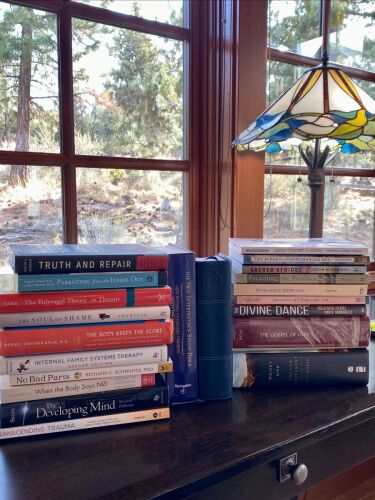 How do you feel about transitions?
How do you feel about transitions?
Life is full of them, but that doesn’t mean we enthusiastically embrace them. Transitions—planned or unplanned, chosen or imposed upon us—provoke various responses from our internal family.
Transitions include routine events, like returning to work after vacation, milestone events like launching a child into college or yourself into a new endeavor, and unexpected (unwelcome) events like illness or the death of loved ones.
What transition are you navigating?
Have you noticed waves of different emotions and thoughts pinballing through your mind? These are reactions of your internal family members to change.
Some will be excited by new challenges, and others will grieve the loss inherent in transitions. There will be those who fear the impact of change and others who despair or feel hopeless about the change they did not foresee.
I am entering a new decade (turning 60 in September)—a change over which I have no control. And I started a new graduate program last week—entirely my choice. (I’m pretty sure the two are related!)
I surprised myself with a sudden decision to embark on my third master’s degree (in Christian spiritual formation). One part of me says, “You should have never looked at the curriculum,” because another part of me was so excited when I saw it I had to apply. Do you have a part that responds to shiny, sparkly things? That’s how this part of me is about learning.
Now that I’m in it, there are weekly assignments, and I am adjusting my schedule to meet clients’ needs and continue working on the manuscript of my next book—so, whew. It’s a lot. But parts of me are good at managing time and staying on task.
The ones needing more attention are focused on how the group will receive me. Will the professor respond well to my work? If I’m authentic, will I be accepted?
They need compassionate connection—time to share their concerns. They’re vulnerable, so they have protectors who might jump in and take over to minimize risk. Making time for them will reassure them, allowing me to lead with curiosity and anticipation rather than fear.
When we choose a transition, we have the opportunity to plan and be intentional about connecting with parts of us reacting to it. That helps us ease into a new season.
What if I didn’t choose this transition?
When change is unplanned and unwelcome, we are more likely to be blended with parts of us who are fearful, hopeless, anxious, or grieving. It can feel like you’ve lost access to resources like compassion, clarity, and calm.
You have the God-given resources needed to navigate change.
They are there, but layers of conflicting thoughts and emotions cover them. The intensity of the reaction among internal family members requires more of your attention.
Here’s a practice to use during a transition:
Find a quiet place with minimal external distractions. As you turn your attention inside, scan your body. Bring your focus to where you feel the most tension. Just be with the sensation, using your deep inhale and exhale to create a welcoming space for connection. You might notice more information—thoughts, images, emotions—connected to the sensation. Allow it to be just as it is without needing it to change.
Connection calms distressed members of your inner family. Listening to their concerns and creating space for their emotions reassures them that they are not alone. As they feel your confidence and care, they relax, and you have more access to resources like clarity, courage, and creativity.
The more change affects your inner system, the more crucial it is to spend time with the parts of you reacting to it.
Their emotions are valid and deserve a witness. They also offer essential information—like the parts of me who had suggestions about managing my time. Connection builds trust, and as they trust you, they let you lead, drawing on your God-given resources.
May the loving relationships you nurture with your inner family members open space for peace and joy as you navigate change.




Leave A Comment